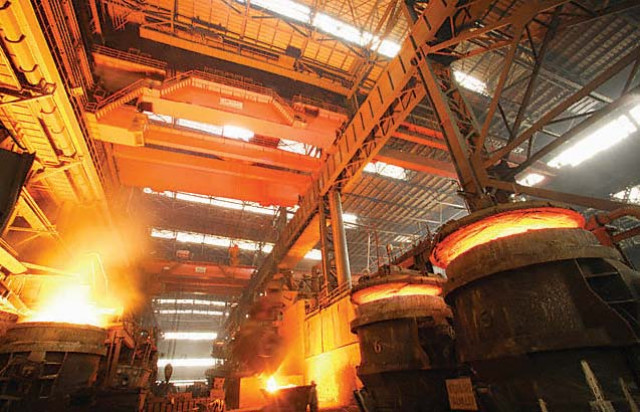Steel rebar prices start rising again
Rates go up on the back of increase in cost of production

Steel rebar prices have once again started rising due to an increase in electricity tariff and raw material prices in the international market.
The increase in prices of rebars came on the back of a rise in the cost of production, said JS Global steel analyst Arsalan Ahmed in comments to The Express Tribune.
Domestic steel rebar prices are expected to cross Rs150,000 per ton due to a surge in global scrap rates, which have gone up from $350 per ton in October to $455 per ton, and because of a recent 10% increase in power tariff for the energy-intensive steel industry.
“The increase of Rs4 per unit in electricity tariff for Pakistan’s developing steel industry will prove to be the proverbial last straw that breaks the camel’s back and will be detrimental to the government plan for affordable housing for the low and middle-income people,” said Pakistan Association of Large Steel Producers (PALSP) Secretary-General Wajid Bukhari.
Global scrap prices were set to spike with growth in demand for ferrous scrap in China to 12 million tons a year, he added.
“Large steel producers are one of the major consumers of K-Electric,” Bukhari said, adding, “PALSP has lodged protest over the recent increase in tariff through SRO 192 dated February 12, 2021.”
He said, “This increase is creating a crisis-like situation for the struggling steel sector of Pakistan.”
Through the SRO, variable charges had been increased by Rs1.95 per kWh and fixed charges were also increased, he said. “Instead of increasing the fixed charges, these should be reduced.”
In Pakistan, all cost of the distribution system - grid, cable, substation, transformer, etc - was borne by the consumer, then why should the consumer pay heavy fixed charges for electricity connection, he asked.
“The association is of the view that the tariff change should be reconsidered and properly aligned,” the PALSP secretary-general said.
In Bangladesh, fixed charges are only 70.92 US cents for B4 customers whereas they stand at 250 US cents - after the recent increase - in Pakistan, meaning the tariffs are over 350% higher compared to the regional competitors.
According to the Pakistan Bureau of Statistics, imports of iron and steel scrap by Pakistan rose 13.5% in 2020 as compared to the previous year with annual iron and steel scrap imports rising to 4.57 million tons from 4.02 million tons. The industry had long been pleading for a cut in the 1.5% turnover tax on the steel industry to 0.25% to provide it with a breathing space, said Bukhari.
“We’ve been pursuing the matter for long and in principle there is a broad consensus that this is an unfair tax on the documented sector. Authorities say the issue will be addressed in the upcoming budget, which is not justifiable because it will be too late for the industry by then.”
The government has already slashed the minimum tax on dealers and sub-dealers of sugar, cement and edible oil to 0.25% whose names are on the Active Taxpayers’ List issued under the provisions of Sales Tax Act 1990 and Income Tax Ordinance 2001.
“The steel industry operates on thin margins. Thus, the existing minimum tax is not only a burden on the cash flow of manufacturers, but it will also discourage future investment in the industry,” he said.
Published in The Express Tribune, February 23rd, 2021.
Like Business on Facebook, follow @TribuneBiz on Twitter to stay informed and join in the conversation.



















COMMENTS
Comments are moderated and generally will be posted if they are on-topic and not abusive.
For more information, please see our Comments FAQ